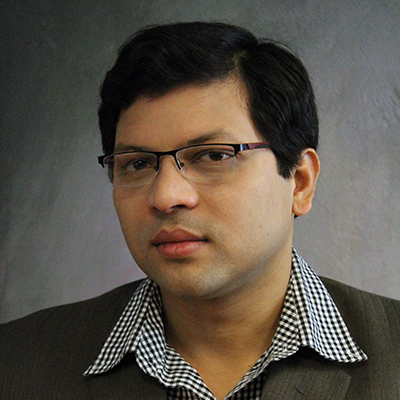Professor Shreyas Sen wins Google Faculty Research Award to work on Secure Human Computer Interaction
ECE Assistant Professor Shreyas Sen has been awarded the Google Faculty Research Award (FRA). Professor Sen received the Google FRA in the category of Physical Interfaces and Immersive Experiences. Among other topics, his research focuses on Human Body Communication (HBC), which focuses on using the human body as a conducting medium to securely, safely, and energy-efficiently connect wearable and implantable devices and sensors. Google’s Award supports Secure Human-Computer Interaction (HCI) using Human Body Communication. Professor Sen is also a recent recipient of the AFOSR Young Investigator Award 2017.
The Google FRAs are one-year awards to universities to support the work of world-class permanent faculty members at top universities around the world. The intent of the award is to support cutting-edge research in Computer Science, Engineering, and related fields. This round Google received 876 proposals covering 44 countries and over 300 universities. After expert reviews and committee discussions, Google decided to fund 143 projects (16%).
Professor Sen has been with Purdue University's School of Electrical and Computer Engineering since January 2016, prior to which he was a Research Scientist at Intel Labs since his Ph.D. in 2011 from Georgia Tech. At Intel, he developed the world’s fastest mm-scale Capacitive Proximity Communication and contributed to the USB-C type specification. At Georgia Tech, Professor Sen worked on the first Self-Learning Channel-Adaptive Radio. His current research interests include sensing and communication circuits/systems for Internet of Things (IoT), Biomedical and Security. He has authored/co-authored 2 book chapters, over 90 journal and conference papers and has 11 patents granted/pending.
Professor Sen is a recipient of the DoD AFOSR Young Investigator Award 2017, Intel Labs Divisional Recognition Award 2014 for industrywide impact on USB-C type, Intel Corporation PhD Fellowship 2010-11, IEEE Microwave Theory and Technique Society (IEEE MTT-S) Graduate Fellowship Award 2008, UC Berkeley GSRC Margarida Jacome Best Research Award 2007, IEEE ICCAD Best-in-Track Award 2014, IEEE VTS Honorable Mention Award 2014, Intel Labs Quality Award 2012, Best Paper Award (Silver) in IEEE MTT-S RWS 2008, SRC Inventor Recognition Award 2008, and IISC Young Engineering Fellowship in 2005. He serves/has served as an Associate Editor of IEEE Design & Test, Publicity Chair in ETS, Organizer in DAC, ITC, IEEE Sensors and Program Committee member of DATE, ICCAD, ITC, VLSI Design, IMSTW and VDAT.

